Unit 3 Teenage problems Grammar 课件(共31张PPT) 牛津译林版九年级英语上册
文档属性
| 名称 | Unit 3 Teenage problems Grammar 课件(共31张PPT) 牛津译林版九年级英语上册 |
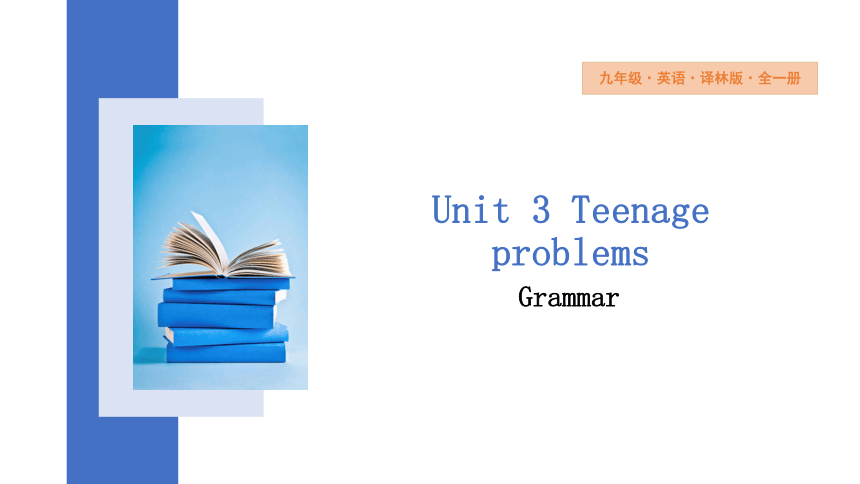
|
|
| 格式 | pptx | ||
| 文件大小 | 740.8KB | ||
| 资源类型 | 教案 | ||
| 版本资源 | 牛津译林版 | ||
| 科目 | 英语 | ||
| 更新时间 | 2024-01-12 15:44:18 | ||
图片预览

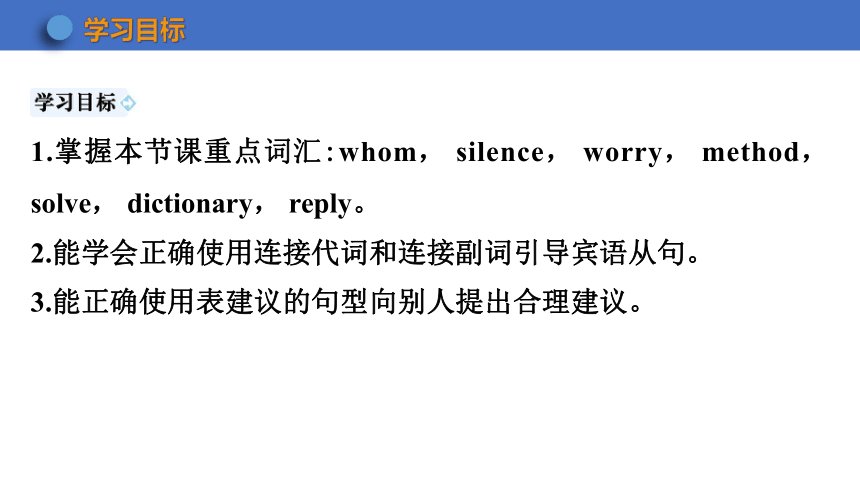

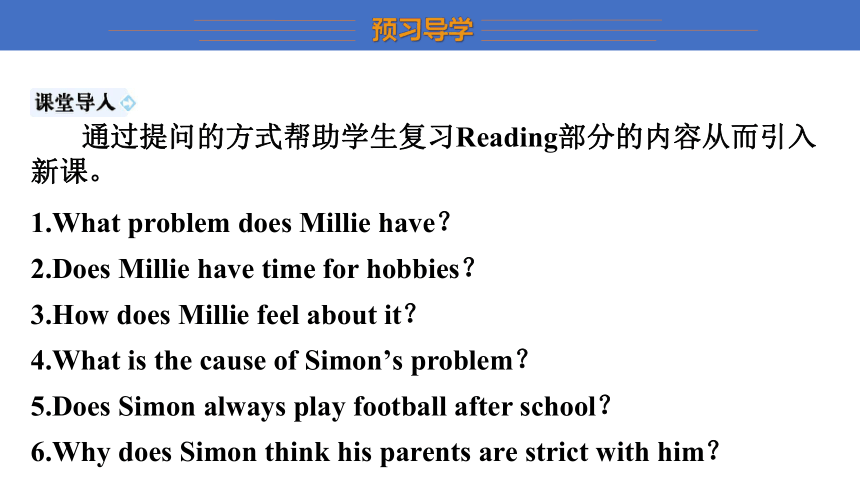
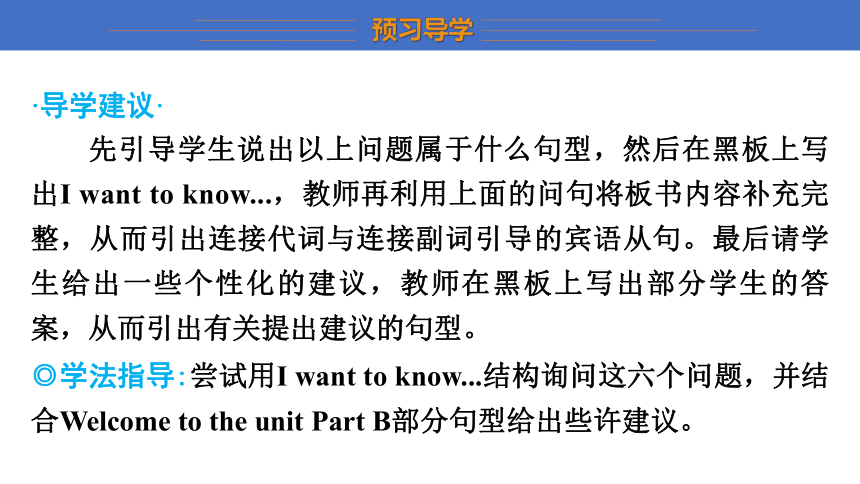

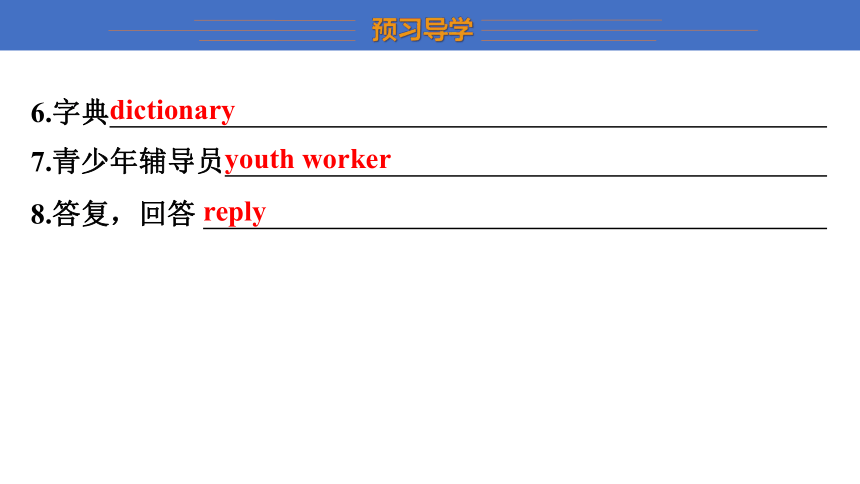
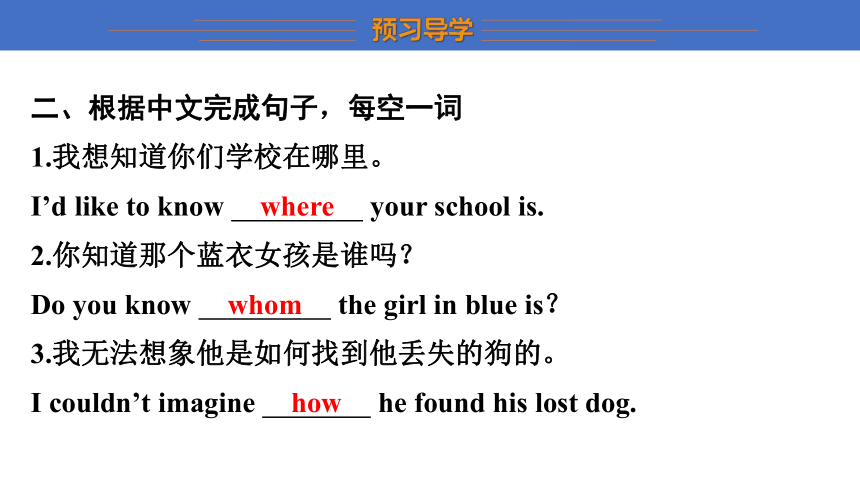
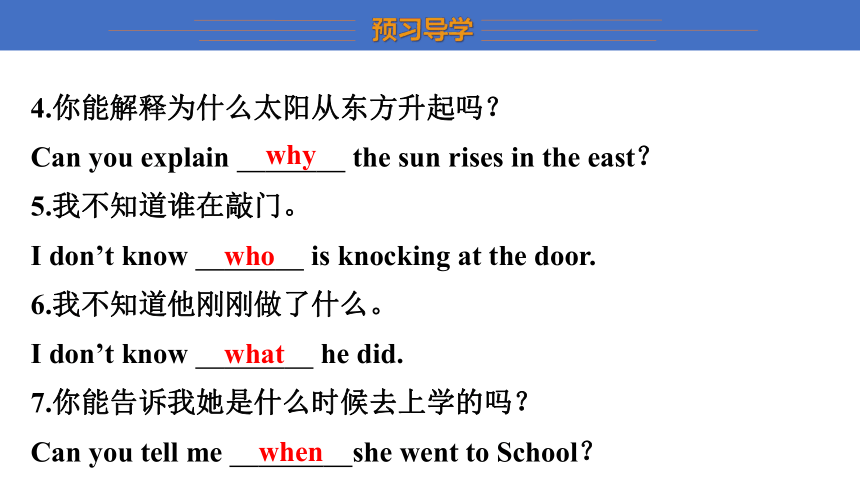

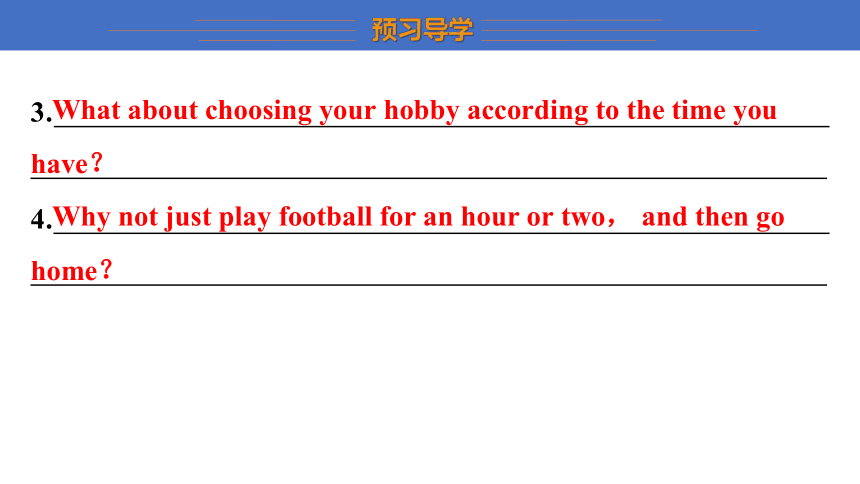

文档简介
(共31张PPT)
九年级·英语·译林版·全一册
Unit 3 Teenage problems
Grammar
1.掌握本节课重点词汇:whom, silence, worry, method, solve, dictionary, reply。
2.能学会正确使用连接代词和连接副词引导宾语从句。
3.能正确使用表建议的句型向别人提出合理建议。
1.完成预习导学,达成学习目标1。
2.完成任务驱动一,达成学习目标2。
3.完成任务驱动二,达成学习目标3。
通过提问的方式帮助学生复习Reading部分的内容从而引入新课。
1.What problem does Millie have?
2.Does Millie have time for hobbies?
3.How does Millie feel about it?
4.What is the cause of Simon’s problem?
5.Does Simon always play football after school?
6.Why does Simon think his parents are strict with him?
·导学建议·
先引导学生说出以上问题属于什么句型,然后在黑板上写出I want to know...,教师再利用上面的问句将板书内容补充完整,从而引出连接代词与连接副词引导的宾语从句。最后请学生给出一些个性化的建议,教师在黑板上写出部分学生的答案,从而引出有关提出建议的句型。
◎学法指导:尝试用I want to know...结构询问这六个问题,并结合Welcome to the unit Part B部分句型给出些许建议。
一、汉译英
1.谁(宾格)whom
2.安静,寂静;沉默silence
3.担心;令人担忧的事worry
4.方法method
5.解决;解答 solve
whom
silence
worry
method
solve
6.字典dictionary
7.青少年辅导员youth worker
dictionary
youth worker
8.答复,回答 reply
reply
二、根据中文完成句子,每空一词
1.我想知道你们学校在哪里。
I’d like to know where your school is.
2.你知道那个蓝衣女孩是谁吗?
Do you know whom the girl in blue is?
3.我无法想象他是如何找到他丢失的狗的。
I couldn’t imagine how he found his lost dog.
where
whom
how
4.你能解释为什么太阳从东方升起吗?
Can you explain why the sun rises in the east?
5.我不知道谁在敲门。
I don’t know who is knocking at the door.
6.我不知道他刚刚做了什么。
I don’t know what he did.
7.你能告诉我她是什么时候去上学的吗?
Can you tell me when she went to School?
why
who
what
when
三、想一想
找一找本单元出现的表示提建议的句子并写下来。
1.Why not eat less and exercise more?
2.Perhaps you should mange your time better and go to bed earlier.
Why not eat less and exercise more?
Perhaps you should mange your time better and go to bed
earlier.
3.What about choosing your hobby according to the time you have?
What about choosing your hobby according to the time you
have?
4.Why not just play football for an hour or two, and then go home?
Why not just play football for an hour or two, and then go
home?
连接代词和连接副词引导的宾语从句
·导学建议·
先让学生了解什么是连接代词,什么是连接副词,它们在句子中做什么成分。然后再讨论总结宾语从句用什么语序,时态如何应用。
◎学法指导:掌握由连接代词与连接副词引导的宾语从句三要素:连接词,语序和时态。
1.用宾语从句改写下列句子。
(1)Who will come this afternoon?
Do you know who will come this afternoon ?
(2)What did she say?
Do you hear what she said ?
(3)Whose is that?
I don’t know whose that is .
who will come this afternoon
what she said
whose that is
(4)Which bus do we have to take?
Could you tell me which bus we have to take ?
(5)Whom is Dan writing to?
I wonder whom Dan is writing to .
which bus we have to take
whom Dan is writing to
◎用法总结:
宾语从句可由连接代词 what/who/whom/whose/which 等引导,它们在宾语从句中可作主语、宾语、表语或定语等,因此不能 省略 。
what/who/whom/whose/which
省略
注意:一般疑问句或特殊疑问句改为宾语从句后要改为 陈述句 语序,如果连接代词在宾语从句中作 主语 ,语序无须改变。句末标点符号看主句,如果主句是陈述句,句末用 句号 ;如果主句是疑问句,句末用 问号 。
陈述
句
主语
句
号
问号
2.翻译下列句子。
(1)我们不知道她将什么时候回来。
We don’t know when she will come back.
(2)你能告诉我怎样到达邮局吗?
Can you tell me how I can get to the post office?
We don’t know when she will come back.
Can you tell me how I can get to the post office?
(3)我不知道他去了哪里。
I don’t know where he has gone.
I don’t know where he has gone.
(4)我无法理解他为什么总是上学迟到。
I can’t understand why he is always late for school.
I can’t understand why he is always late for school.
◎用法总结:
宾语从句也可由连接副词 when/where/how/why 等引导,它们在宾语从句中作 状语 ,不可省略。含有how的疑问词组也可引导宾语从句,主要有how old、how many、 how much、how often等。
when/where/how/why
状语
3.用所给词的适当形式填空。
(1)The radio says it will be (be) cloudy tomorrow.
(2)The headmaster hopes everything goes (go) well.
(3)Tom says that they were playing (play) basketball at six o’clock yesterday evening.
(4)I heard he had returned (return) it already.
(5)He asked what they were doing (do) at eight last night.
will be
goes
were playing
had returned
were doing
(6)The teacher told his class that light travels (travel) faster than sound.
(7)I hear you are talking (talk) about the relay race now.
(8)I didn’t know whom the letters were (be) from.
travels
are talking
were
◎用法总结:
宾语从句有自己的时态原则。当主句时态为一般现在时时,宾语从句用自己所需要的 时态 ;当主句时态为一般过去时时,宾语从句也要用 相应的过去时 ;当宾语从句讲述的是客观事实或真理时,从句用 一般现在时 。
时态
相应的过去时
一般现在时
表建议的句型
·导学建议·
通过对话,让学生自己说出他们自己的烦恼,其他学生提出建议,在此过程中教师引导学生正确使用表建议的句型。
◎学法指导:针对其他同学的烦恼,结合自己的实际,准确使用表建议的句型给出合理建议。
A:Hello, ...These days I have a problem. I spend much time playing computer games.I don’t know why I’m so crazy about computer games. I wonder what I should do.
B:I’m sorry to hear that. Why not...?/... I hope that will help.
A:Thank you.I feel much better now.
B:You are welcome.
I spend much time
playing computer games.I don’t know why I’m so crazy about
computer games.
Why not...?/...
I need silence when I’m studying.当我学习时我需要安静。
◎观察思考:
I need silence when I’m working.当我工作时我需要安静。
We looked at each other in silence.我们沉默地相互对视。
◎用法总结:
silence为名词时,意为“安静,寂静;沉默”。常用短语in silence,意为“静静地”。silent为形容词时,意为“安静的”。
用所给词的正确形式填空。
She sat in the corner in silence (silent).
silence
I need someone to share my worries with.我需要有人来分担我的烦恼。
◎观察思考:
His actions always make me worried.他的行为总是让我担心。
A lot of Mums and Dads have the same worries.许多父母有同样的担忧。
◎用法总结:
worry此处为可数名词,意为“令人担忧的事”,其复数形式为worries;也可用作不可数名词,意为“烦恼,担忧”。
用所给词的正确形式填空。
1.I have many worries (worry).
2.Too much worry (worry) made him look old.
worries
worry
Soon they got his replies.很快他们得到了他的答复。
◎观察思考:
We’ve got a few replies.我们已经得到了一些答复。
I don’t know how to reply to this question.我不知道如何回答这个问题。
◎用法总结:
reply作可数名词,意为“答复;回答”;reply还可以作动词,意为“回答,答复”,后常接动词不定式,表示回答、回复别人的问题、信件等;也可接that从句。
翻译下列句子。
1.我期待着你的答复。
I’m looking forward to your reply.
2.我没有回他的信。
I didn’t reply to his letter.
I’m looking forward to your reply.
I didn’t reply to his letter.
九年级·英语·译林版·全一册
Unit 3 Teenage problems
Grammar
1.掌握本节课重点词汇:whom, silence, worry, method, solve, dictionary, reply。
2.能学会正确使用连接代词和连接副词引导宾语从句。
3.能正确使用表建议的句型向别人提出合理建议。
1.完成预习导学,达成学习目标1。
2.完成任务驱动一,达成学习目标2。
3.完成任务驱动二,达成学习目标3。
通过提问的方式帮助学生复习Reading部分的内容从而引入新课。
1.What problem does Millie have?
2.Does Millie have time for hobbies?
3.How does Millie feel about it?
4.What is the cause of Simon’s problem?
5.Does Simon always play football after school?
6.Why does Simon think his parents are strict with him?
·导学建议·
先引导学生说出以上问题属于什么句型,然后在黑板上写出I want to know...,教师再利用上面的问句将板书内容补充完整,从而引出连接代词与连接副词引导的宾语从句。最后请学生给出一些个性化的建议,教师在黑板上写出部分学生的答案,从而引出有关提出建议的句型。
◎学法指导:尝试用I want to know...结构询问这六个问题,并结合Welcome to the unit Part B部分句型给出些许建议。
一、汉译英
1.谁(宾格)whom
2.安静,寂静;沉默silence
3.担心;令人担忧的事worry
4.方法method
5.解决;解答 solve
whom
silence
worry
method
solve
6.字典dictionary
7.青少年辅导员youth worker
dictionary
youth worker
8.答复,回答 reply
reply
二、根据中文完成句子,每空一词
1.我想知道你们学校在哪里。
I’d like to know where your school is.
2.你知道那个蓝衣女孩是谁吗?
Do you know whom the girl in blue is?
3.我无法想象他是如何找到他丢失的狗的。
I couldn’t imagine how he found his lost dog.
where
whom
how
4.你能解释为什么太阳从东方升起吗?
Can you explain why the sun rises in the east?
5.我不知道谁在敲门。
I don’t know who is knocking at the door.
6.我不知道他刚刚做了什么。
I don’t know what he did.
7.你能告诉我她是什么时候去上学的吗?
Can you tell me when she went to School?
why
who
what
when
三、想一想
找一找本单元出现的表示提建议的句子并写下来。
1.Why not eat less and exercise more?
2.Perhaps you should mange your time better and go to bed earlier.
Why not eat less and exercise more?
Perhaps you should mange your time better and go to bed
earlier.
3.What about choosing your hobby according to the time you have?
What about choosing your hobby according to the time you
have?
4.Why not just play football for an hour or two, and then go home?
Why not just play football for an hour or two, and then go
home?
连接代词和连接副词引导的宾语从句
·导学建议·
先让学生了解什么是连接代词,什么是连接副词,它们在句子中做什么成分。然后再讨论总结宾语从句用什么语序,时态如何应用。
◎学法指导:掌握由连接代词与连接副词引导的宾语从句三要素:连接词,语序和时态。
1.用宾语从句改写下列句子。
(1)Who will come this afternoon?
Do you know who will come this afternoon ?
(2)What did she say?
Do you hear what she said ?
(3)Whose is that?
I don’t know whose that is .
who will come this afternoon
what she said
whose that is
(4)Which bus do we have to take?
Could you tell me which bus we have to take ?
(5)Whom is Dan writing to?
I wonder whom Dan is writing to .
which bus we have to take
whom Dan is writing to
◎用法总结:
宾语从句可由连接代词 what/who/whom/whose/which 等引导,它们在宾语从句中可作主语、宾语、表语或定语等,因此不能 省略 。
what/who/whom/whose/which
省略
注意:一般疑问句或特殊疑问句改为宾语从句后要改为 陈述句 语序,如果连接代词在宾语从句中作 主语 ,语序无须改变。句末标点符号看主句,如果主句是陈述句,句末用 句号 ;如果主句是疑问句,句末用 问号 。
陈述
句
主语
句
号
问号
2.翻译下列句子。
(1)我们不知道她将什么时候回来。
We don’t know when she will come back.
(2)你能告诉我怎样到达邮局吗?
Can you tell me how I can get to the post office?
We don’t know when she will come back.
Can you tell me how I can get to the post office?
(3)我不知道他去了哪里。
I don’t know where he has gone.
I don’t know where he has gone.
(4)我无法理解他为什么总是上学迟到。
I can’t understand why he is always late for school.
I can’t understand why he is always late for school.
◎用法总结:
宾语从句也可由连接副词 when/where/how/why 等引导,它们在宾语从句中作 状语 ,不可省略。含有how的疑问词组也可引导宾语从句,主要有how old、how many、 how much、how often等。
when/where/how/why
状语
3.用所给词的适当形式填空。
(1)The radio says it will be (be) cloudy tomorrow.
(2)The headmaster hopes everything goes (go) well.
(3)Tom says that they were playing (play) basketball at six o’clock yesterday evening.
(4)I heard he had returned (return) it already.
(5)He asked what they were doing (do) at eight last night.
will be
goes
were playing
had returned
were doing
(6)The teacher told his class that light travels (travel) faster than sound.
(7)I hear you are talking (talk) about the relay race now.
(8)I didn’t know whom the letters were (be) from.
travels
are talking
were
◎用法总结:
宾语从句有自己的时态原则。当主句时态为一般现在时时,宾语从句用自己所需要的 时态 ;当主句时态为一般过去时时,宾语从句也要用 相应的过去时 ;当宾语从句讲述的是客观事实或真理时,从句用 一般现在时 。
时态
相应的过去时
一般现在时
表建议的句型
·导学建议·
通过对话,让学生自己说出他们自己的烦恼,其他学生提出建议,在此过程中教师引导学生正确使用表建议的句型。
◎学法指导:针对其他同学的烦恼,结合自己的实际,准确使用表建议的句型给出合理建议。
A:Hello, ...These days I have a problem. I spend much time playing computer games.I don’t know why I’m so crazy about computer games. I wonder what I should do.
B:I’m sorry to hear that. Why not...?/... I hope that will help.
A:Thank you.I feel much better now.
B:You are welcome.
I spend much time
playing computer games.I don’t know why I’m so crazy about
computer games.
Why not...?/...
I need silence when I’m studying.当我学习时我需要安静。
◎观察思考:
I need silence when I’m working.当我工作时我需要安静。
We looked at each other in silence.我们沉默地相互对视。
◎用法总结:
silence为名词时,意为“安静,寂静;沉默”。常用短语in silence,意为“静静地”。silent为形容词时,意为“安静的”。
用所给词的正确形式填空。
She sat in the corner in silence (silent).
silence
I need someone to share my worries with.我需要有人来分担我的烦恼。
◎观察思考:
His actions always make me worried.他的行为总是让我担心。
A lot of Mums and Dads have the same worries.许多父母有同样的担忧。
◎用法总结:
worry此处为可数名词,意为“令人担忧的事”,其复数形式为worries;也可用作不可数名词,意为“烦恼,担忧”。
用所给词的正确形式填空。
1.I have many worries (worry).
2.Too much worry (worry) made him look old.
worries
worry
Soon they got his replies.很快他们得到了他的答复。
◎观察思考:
We’ve got a few replies.我们已经得到了一些答复。
I don’t know how to reply to this question.我不知道如何回答这个问题。
◎用法总结:
reply作可数名词,意为“答复;回答”;reply还可以作动词,意为“回答,答复”,后常接动词不定式,表示回答、回复别人的问题、信件等;也可接that从句。
翻译下列句子。
1.我期待着你的答复。
I’m looking forward to your reply.
2.我没有回他的信。
I didn’t reply to his letter.
I’m looking forward to your reply.
I didn’t reply to his letter.
